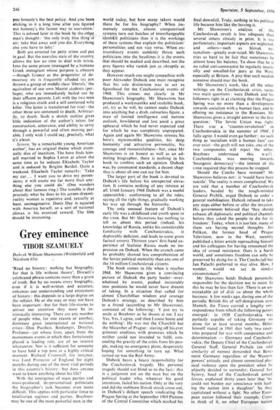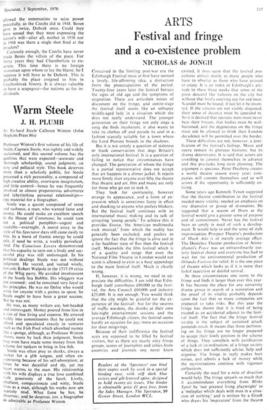Grey eminence
TIBOR SZAMUELY
Dubcek William Shawcross (Weidenfeld and Nicolson 65s) 'Read no history: nothing but biography, for that is life without theory'. Disraeli's celebrated phrase contains more than a grain of truth. But by no means every biography, even if it is well-written and accurate, enhances our understanding and enjoyment of history: this depends to a large degree on the subject. He or she may or may not have been important—but for their life-stories to attract our attention they must be in- trinsically interesting. There are any number of people who, for one reason or another, dominate great international or national crises—Don Pacifico, Boulanger, Dreyfus, Profumo—yet whose lives, apart from the momentous events in which they fortuitously played a leading role, are of no interest whatsoever. Nor is it sufficient for someone to have held a top post at a highly critical moment. Richard Cromwell, for instance, was Lord Protector of England for eight months during one of the most vital periods in this country's history—but does anyone Want to know anything about his life?
With the emergence of mass parties and mass-produced, de-personalised politicians the biographer's task becomes even more difficult. This applies with particular force to totalitarian regimes and parties. Brezhnev may be one of the most powerful men in the world today, but how many takers would there be for his biography? When im- mensely complex, almost computerised systems turn out batches of interchangeable identikit politicians then it is the workings of these systems that explain the politicians' personalities and not vice versa. When ex- traordinary events suddenly thrust such politicians into the headlines it is the events that should be studied and described, not the grey figures who vanish just as abruptly as they appear.
However much one might sympathise with poor Alexander Dubcek one must recognise that his sole distinction ,was to act as figurehead for the Czechoslovak events of 1968. This comes out clearly in Mr Shawcross's biography. Mr Shawcross has produced a workmanlike and readable book, yet, try as he will, he cannot make Dubcek into anything but a drab, colourless figure, a man of limited intelligence and narrow outlook, bewildered and lost amid a great upheaval which he had never expected and for which he was completely unprepared. Again and again Mr Shawcross stresses his hero's statesmanlike qualities, his deep humanity and attractive personality, his courage and resourcefulness—but, since Mr Shawcross is an honest as well as an ad- miring biographer, there is nothing in his book to confirm such an opinion. Dubcek was, by communist standards, a decent chap: that is about all one can say for him.
The larger part of the book is devoted to Dubcek's life before his unexpected eleva- tion. It contains nothing of any interest at all. Until January 1968 Dubcek was a model apparatchik : conforming to all the rules, saying all the right things, gradually working his way up through the hierarchy.
The only unusual feature of Dubcek's early life was a childhood and youth spent in
the USSR. But Mr Shawcross has nothing to
tell us about this period (indeed, his knowledge of Russia, unlike his considerable familiarity with Czechoslovakia, is deplorably deficient, and leads to some gross factual errors). Thirteen years' first-hand ex- perience of Stalinist Russia made no im- pression on Dubcek. When the crunch came he probably showed less comprehension of the Soviet political mentality than any one of the 14 million Czechoslovak citizens.
The book comes to life when it reaches 1,968. Mr Shawcross gives a convincing picture of Dubcek the party leader—over- whelmed by events, pushed inexorably into positions he would never have dreamt of taking. In a situation that called for almost Churchillian wisdom and courage Dubcek's strategy, as described by him to a friend (according to Mr Shawcross), consisted of the following : `I just try to smile at Brezhnev as he shouts at me. I say Yes, Yes, I agree, and then I come home and do nothing'. He was not the Churchill but the Micawber of Prague : staving off hiaever grimmer creditors with promises which he neither could nor intended to fulfil, con- cealing the gravity of the crisis from his peo- ple, making no emergency plans, desperately hoping for something to turn up. What turned up was the Red Army.
Dubcek bears a heavy responsibility for the Czechoslovak tragedy. His personal tragedy should not blind us to the fact : this is a judgment not on the man but on the political leader who, whatever his good intentions, failed his nation. Only at the very end did the stubborn Slovak streak come out; in Dubcek's defiant speech vindicating the Prague Spring at the September 1969 Plenum of the Central Committee which marked his final downfall. Truly, nothing in his political life became him like the leaving it.
Mr Shawcross's analysis of the Czechoslovak revolt is less adequate than several others already in print. It is too perfunctory; important aspects are neglected, and others—such as Slovak na- tionalism—greatly over-rated. Mr Shawcross tries so hard to be fair that sometimes he almost loses his balance. To show that he is no rabid anti-communist he regularly inserts silly and uncalled-for jeers at the West, especially at Britain. A pity that such modish nonsense should mar the book.
Mr Shawcross's work, like all the other writings on the Czechoslovak crisis, raises two main questions: were Dubcek and his followers right in a) claiming that the Prague Spring was no more than a development towards socialism with a human face, and b) offering no resistance to the Russians. Mr Shawcross gives a straight answer to the first question : 'The Soviet Union was right.
There was a "counter-revolution" in Czechoslovakia in the summer of 1968'. I fully agree. I would even go further : no such thing as 'socialism with a human face' can ever exist—the graft will not take, one of the
two components will reject the other. Brezhnev understood this well. Czechoslovakia was moving towards 'bourgeois democracy'—the interest of the USSR required that this process be stopped.
Should the ,Czechs have resisted? Mr Shawcross believes not: it 'would have been suicide'. The reality is more complicated. We are told that a number of Czechoslovak leaders, headed by the tough-minded General Prchlik, urged Dubcek to order a general mobilisation. Dubcek refused to take any steps either before or after the invasion.
His government believed that 'they should exhaust all diplomatic and political channels before they asked the people to die for its freedom'. Today, when it is too late, many of them are having second thoughts. Jiri Pelikan, the former head of Prague Television, now in the West, recently published a bitter article reproaching himself and his colleagues for having renounced the idea of armed resistance. Ours is a harsh world, and sometimes freedom can only be preserved by dying for it. The Czechs (all but Jan Palach) preferred to stay alive. How, I wonder, would we act in similar circumstances?'
Mr Shawcross holds Dubcek personally responsible for the decision not to resist. In this he may be less than fair. There is an un-
mistakable air of dim vu about the whole business. A few weeks ago, during one of the
periodic British fits of self-denigration over Munich, the Times carried a lengthy cor- respondence from which the following points emerged : in 1938 Czechoslovakia was perfectly capable of taking Germany on alone for at least several months; Hitler himself stated in 1941 that 'only two coun- tries prepared for war with competence and determination — Germany and Czechoslo- vakia; the Deputy Chief of the Czechoslovak General Staff, General Prchala (an odd similarity of names) demanded that Benes resist Germany regardless of the Western powers' attitude, and almost committed phy- sical violence upon the president when he abjectly decided to surrender; General Jan Syrovy, head of the Czechoslovak armed forces, explained thirty years later that 'we could not burden our conscience with lead- ing the nation into a slaughter'. So they capitulated without a fight. No other Euro- pean nation followed their example. Come to think of it, no other European nation allowed the communists to seize power peacefully, is the Czechs did in 1948. Benes gave in twice, Dubcek once. Could they have sensed that they were expressing the nation's will—after all, neither in 1938 nor in 1968 was there a single shot fired at the invaders?
Curiously enough, the Czechs have never made Benes the villain of the piece. For thirty years they had Chamberlain to ex- ecrate. This time there is no foreign statesman upon whom to lay the blame. So I suppose it will have to be Dubcek. This is probably the place assigned to him in Czechoslovak history. It is always valuable to have a scapegoat—for nations as for in- di% iduals.































 Previous page
Previous page